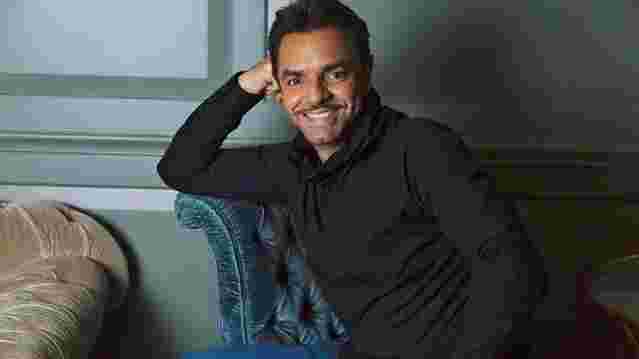HOMBRE Exclusive: Eugenio Derbez Returns To Theaters With A “Radical” Hit
30 Oct 2023 by Francisco Romeo in Advice, Celebrities, Event, Fame, Film, Films, General, Home, Languages, Money, Music, Pleasure, Power, Profile, Self Help, Stars, Television, Theater

Eugenio Derbez returns to film screens this fall in a heartwarming story of an inspirational educator and his young students. The revolutionary teaching style motivates his class to reach heights far beyond their potential. We sat down with the recent Academy Award recipient to talk about the challenges of portraying a real live person, his advice on success, and his greatest teacher. “Radical” opens in theaters nationwide on Friday, November 3rd.
Derbez, has captured the hearts of audiences and critics alike, earning multiple awards at its recent film festival screenings. From Pantelion Films and Participant, a leading media company dedicated to entertainment that stands at the intersection of art and activism, in partnership with 3Pas Studios, “Radical” opened in Mexico becoming the #1 in the box office over the weekend, a spot it held throughout the week. It will open in more than 400 theaters in the United States and Puerto Rico on November 3. The film is based on a Wired Magazine article that inspired filmmakers to bring the story to life.
Click here to watch the trailer.
 In “Radical” Derbez takes on the role of Sergio Juarez Correa, a frustrated teacher in a Mexican border town plagued by neglect, corruption, and violence who tries a radical new method to unleash the curiosity and potential of his students. The film is based on a true story.
In “Radical” Derbez takes on the role of Sergio Juarez Correa, a frustrated teacher in a Mexican border town plagued by neglect, corruption, and violence who tries a radical new method to unleash the curiosity and potential of his students. The film is based on a true story.
HOMBRE: How was your preparation for this role?
Eugenio Derbez: Obviously it’s something out of my comfort zone, which is comedy. It was intimidating to play the role of someone who is still alive, and someone who you know will see the film.
But on the other hand it allowed me to better prepare because I had the opportunity to speak with him, get to know him, to ask questions, to see how he interacted with the kids, to capture his essence as a teacher. What he would say helped me, and made me reflect.
It made the story much more real because this story is based on real life events. That helped me better connect with the kids and to better interpret the role. But it really was a major challenge for me.
H: There are so many important messages in the film, which would you say is the best lesson that it delivers?
ED: Some people say that it may be a criticism of the school system, but this is a film that speaks about a teacher that without resources, without having anything to work with alongside the kids, he was able to make them move forward. So it’s that.
The inspiration is that without anything he’s able to make such major positive changes. Only with ingenuity, with humor, and with a lot of hope. The reality is that it’s a story worth telling. That’s what inspires the most.
H: Now going back to your childhood, who was the person that motivated you and gave you the best lessons to live your life?
ED: My mother. My mother was who inspired me most. She was my teacher in her own way. I learned the art of acting by watching her work. I liked to watch how involved she was with her roles, how she studied her characters. Those kinds of things made a mark on me. That’s why I consider that my mom was my best teacher. H: What would you say is the key to success?
H: What would you say is the key to success?
ED: Discipline, I would say. I always tell my kids, you can have a lot of talent but I know a lot of people with great talent that don’t make it. So I would say the main ingredient is discipline and perseverance, ahead of talent. I believe someone who is disciplined and perseveres would go further than someone who has talent. That’s the key.
 H: That’s what you told us when we interviewed you ten years ago. And ten years ago you also worked with children, and now you work with kids again; how is that experience?
H: That’s what you told us when we interviewed you ten years ago. And ten years ago you also worked with children, and now you work with kids again; how is that experience?
ED: It’s refreshing to work with kids. But it has a lot of risks. One of them is that they almost always steal the screen. They say don’t work with kids or animals because they will make you disappear (laughs).
But I feel it’s a joy to work with children. I love it, almost all of my most recent films have children. And it’s not that I look for it (laughs).
I feel it’s a 24/7 kind of job. The fact of being in a set working with children implies that to really connect with them you have to become their friend, you have to play with them, you have to be involved with them.
Children aren’t stupid, they won’t be fooled. They really want to connect so I have to be constantly playing, constantly paying attention, it’s like they become your kids. It’s real. The minute you get to the set you say hi, you talk, you play, you ask questions, you establish a relationship with them so when you start a scene you already have a connection. It’s complicated.













